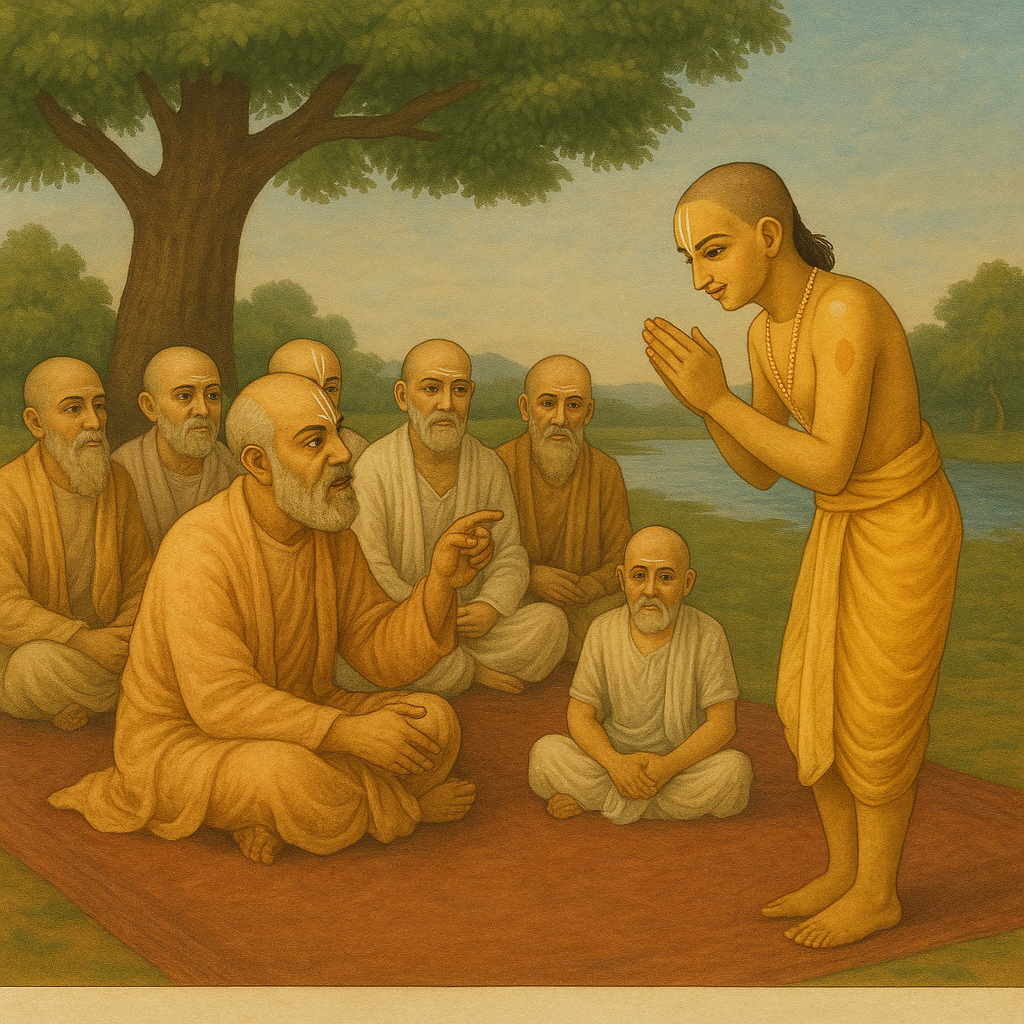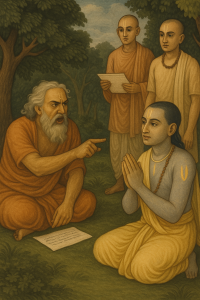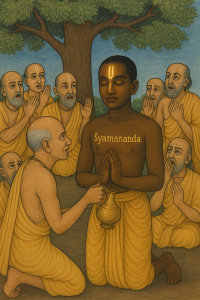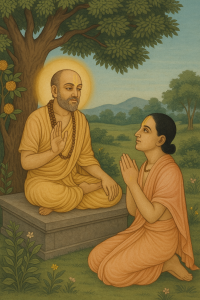(From Śyāmānanda Prakāśa – Chapter 3)
A Fire of Doubt in the Heart of a Guru
Despite Śrī Jīva’s humble reply and Śyāmānanda’s heartfelt explanation, the thunder of uncertainty still echoed in Hrdayānanda Gosvāmī’s heart. A quiet storm brewed within him—not of hatred, but of grief and confusion.
“When did I ever appear in his dream?” he wondered aloud. “How can a disciple invent a story like this? Can a dream change a name and tilak? The world knows dreams are illusory.”
He could not accept that something so sacred and significant had occurred without his conscious knowledge. The idea that he was unaware of such a transformation in his own disciple was deeply painful.
Yet, as a guru, he could not ignore what his heart still whispered: “Could there be something divine in all this that I have missed?”
A Holy Tribunal: The Mahāntas Gather in Vṛndāvana
To bring resolution, Hrdayānanda set out for Vṛndāvana, not alone, but with an assembly of exalted mahāntas—great Vaiṣṇava leaders from Gauḍa-maṇḍala, along with senior disciples of Gaurīdāsa Paṇḍita and other distinguished ācāryas. Their aim was not to humiliate, but to seek truth in the company of the saints.
When they arrived at Dhīra Samīra, by the banks of the sacred Yamunā, the wind carried not only fragrance but the trembling of a sacred test to come.
Śrī Jīva Gosvāmī welcomed them with humility and joy. “O masters of my life,” he said, “you have brought the holy current of Gauḍa to Vraja. What blessing you bestow upon this land!”
Śyāmānanda Bows to All—But One Question Remains
Śyāmānanda arrived and fell flat like a stick at the feet of the mahāntas and his guru, Hrdayānanda. His body was golden, his forehead glowed with Rādhā’s foot-marked tilaka, and his demeanor shone with unwavering devotion.
But Hrdayānanda questioned sternly:
“To whom are you bowing? Is it still to me, your guru? Or have you truly become someone else’s servant?”
With tears in his eyes, Śyāmānanda replied:
“Prabhu, by your mercy I am bowing at your feet and the feet of these exalted saints. You gave me the name Śyāmānanda. The tilak too has come by your mercy.”
Hrdayānanda, still suspicious, challenged him:
“Dreams are not fact. If this name and tilak are truly divine, let them prove themselves before all.”
A Sacred Challenge Issued
Hrdayānanda turned to the assembled saints and declared:
“Let us go to the sacred kuñja of Rāsa-sthalī, under the wish-fulfilling tree. Let the entire assembly witness this truth or falsity. Let Śyāmānanda be tested.”
The entire Vṛndāvana seemed to pause as the mahāntas seated themselves under the kalpa-vṛkṣa, with Śyāmānanda standing humbly before them.
They questioned him one by one:
“Who is your guru? Who gave you your name? How did you receive this tilak?”
Śyāmānanda, with folded hands and a composed heart, responded:
“Śrī Hrdayānanda Gosvāmī is my guru. I have not taken another. The name and tilak appeared to me in a dream in which he himself bestowed them. I spoke the truth then, and I speak the truth now.”
But the mahāntas were stern. They said:
“If this is false, you will be cast from the society of saints. If it is true, let your words be proven. Dreams are dreams, but eternal reality must manifest openly.”
Śyāmānanda bowed deeply and requested:
“Give me two days to answer. Allow me to meditate. I will ask my Lord to speak for me.”
They granted his request.
A Divine Vision: Śyāmānanda Becomes Kanaka-mañjarī
That night, Śyāmānanda sat in deep meditation. Chanting the divine mantra given by Lalitā-devī, he entered the world beyond dreams—the spiritual plane of eternal līlā.
In that sacred realm, he appeared as Kanaka-mañjarī, a golden maidservant of Śrīmatī Rādhārāṇī, sobbing at the doorstep of Rādhā’s residence.
“I am the servant of Lalitā,” she cried to the sakhīs. “But my husband in the material world scolded me and rejected me. I’ve run here to take shelter of my mistress. Please tell Lalitā to rescue me!”
The sakhīs took her to the inner chamber. There, on a divine bed adorned with jeweled silks, sat Śrī Rādhā, fanned by Campakalatā and massaged by Śrī Rūpamañjarī.
When Rādhā saw her fallen at Her feet, She said:
“Who are you, O soul who weeps with longing?”
Kanaka-mañjarī replied with a trembling voice:
“I am your fallen servant, formerly known as Kṛṣṇadāsa. You left your golden anklet in the kuñja. I found it. Lalitā gave me your tilaka and name. But now, my guru has doubted me, and I am condemned by the world. Please rescue me. Prove my service to you.”
Śrī Rādhā’s Divine Judgment
Rādhā smiled and nodded. She called for Suvala, the dear friend of Kṛṣṇa and a celestial witness.
“Suvala,” She said, “this servant has taken shelter of My feet. Give him back the name I gave through Lalitā. Write ‘Śyāmānanda’ on his chest and restore his tilaka before the world.”
Suvala lovingly placed the tilaka—the impression of Śrī Rādhā’s foot—upon Śyāmānanda’s forehead and wrote the name ‘Śyāmānanda’ upon his chest in divine script.
“Go,” he said, “and tell the mahāntas. When they try to erase the marks, just remember us. They will reappear.”
Śyāmānanda fell prostrate at their lotus feet, his heart overflowing. His soul was no longer trapped by misunderstanding. His very being had been rewritten by Rādhā’s own hand.
Reflections and Lessons
- Even saints are tested: Śyāmānanda’s faith and humility were placed before a court of sages. He stood with truth as his only armor.
- Spiritual identity is revealed, not assumed: Śyāmānanda did not ask for the name or tilak. They were bestowed by the will of Śrī Rādhā.
- The soul’s ultimate guru is Rādhā Herself: Even while appearing loyal to his external guru, Śyāmānanda’s inner life was surrendered to Rādhārāṇī, the supreme Mistress of devotion.
- Silence can hold a deeper truth than argument: Śyāmānanda didn’t defend himself with philosophy. He waited in meditation, letting his service speak.
- Mahāprabhu’s movement thrives on both rasa and maryādā: This event is a profound balance between institutional order and the intimate, unpredictable mercy of bhakti-līlā.



